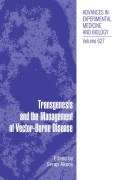
Parasitic, bacterial and viral agents continue to challenge the welfare of humans, livestock, wild life and plants worldwide. The public health impact and financial consequences of these diseases are particularly hard on the already overburdened economies of developing countries especially in the tropics. Manyof these disease agents utilize insect hosts (vectors) to achieve their transmission to mammals. In the past, these diseases were largely controlled by insecticide-based vector reduction strategies. Now, many of these diseases have reemerged in the tropics, recolonizing their previous range, and expanding intonew territories previously not considered to be endemic. Habitat change, irrigation practices, atmospheric and climate change, insecticide and drug resistance as well as increases in global tourism, human traffic and commercial activities, have driven the reemergence and spread of vector borne diseases. INDICE: From the contents 1. Perspectives on The State of Insect Transgenics.- 2. Alphavirus Transducing Systems.- 3. Paratransgenesis Applied for Control of Tsetse Transmitted Sleeping Sickness.- 4. Bacteria of the Genus Asaia: APotential Paratransgenic Weapon Against Malaria.- 5. Proposed Uses of Transposons in Insect and Medical Biotechnology.- 6. The Yin and Yang of Linkage Disequilibrium: Mapping of Genes and Nucleotides Conferring Insecticide Resistancein Insect Disease Vectors.- 7. Impact of Technological Improvements on Traditional Control Strategies.- 8. Insect Population Suppression using Engineered Insects.- 9. Wolbachia-Based Technologies for Insect Pest Population Control.- 10. Using Predictive Models to Optimize Wolbachia-Based Strategies for Vector-Borne Disease Control.
- ISBN: 978-0-387-78224-9
- Editorial: Springer
- Encuadernacion: Cartoné
- Páginas: 185
- Fecha Publicación: 01/07/2008
- Nº Volúmenes: 1
- Idioma: Inglés
